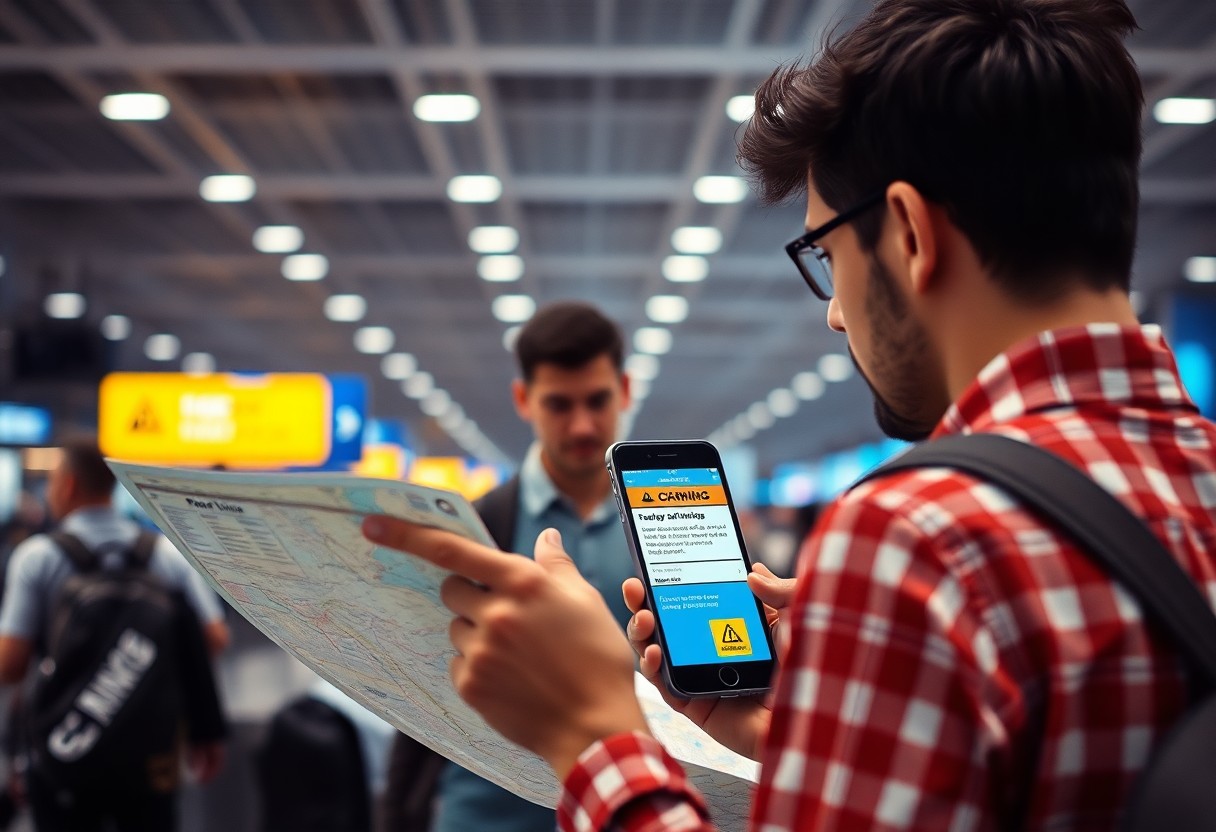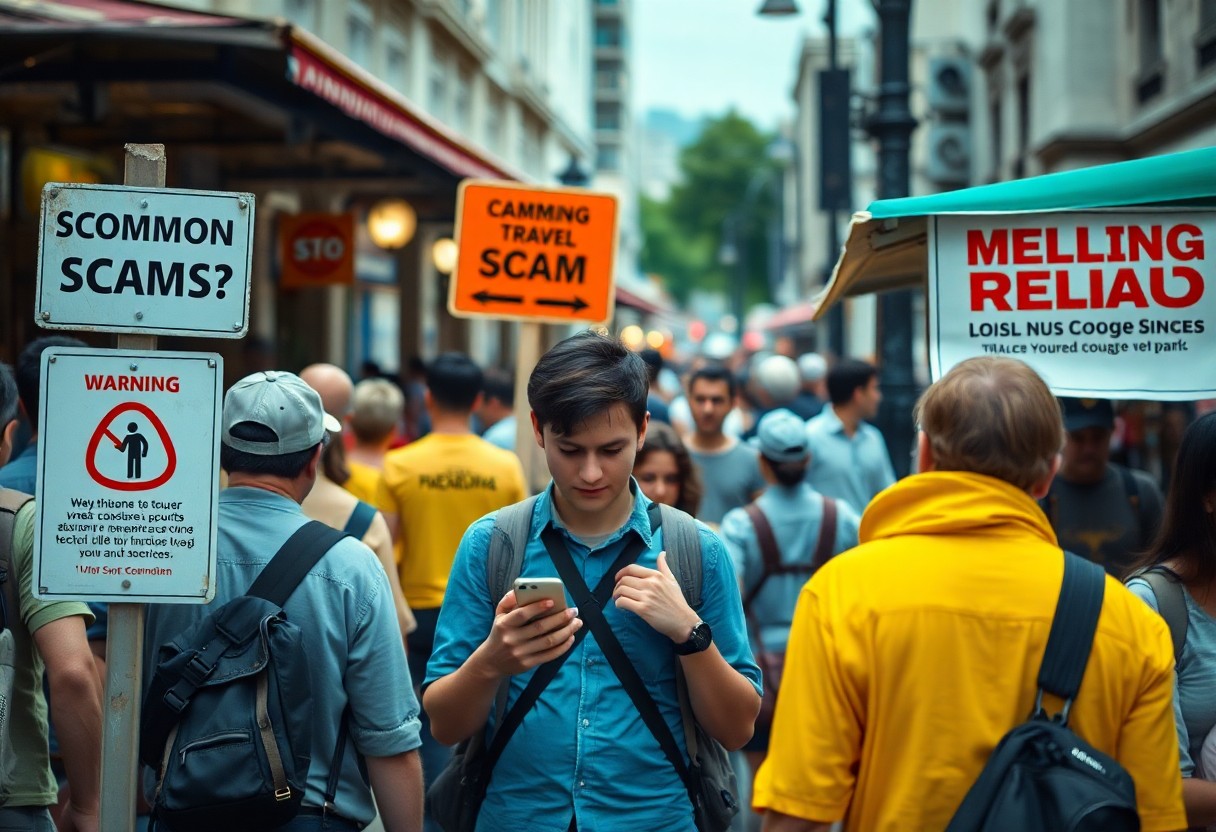
Over your travels, you may encounter various scams designed to exploit unsuspecting tourists. Understanding common travel scams and learning how to outsmart them can protect your money, time, and peace of mind. By staying alert and informed about travel scams to avoid, you can confidently navigate unfamiliar environments and enjoy your trip without falling victim to deceptive tactics. This guide will help you recognize red flags and apply practical strategies to safeguard yourself throughout your journey.
Key Takeaways:
- Be cautious of overly friendly strangers offering unsolicited help or deals, as these can sometimes lead to scams.
- Research common scams specific to your travel destination before you arrive to better identify suspicious situations.
- Use official and reputable sources for booking accommodation, transportation, and tours to avoid fraudulent offers.
- Keep personal belongings secure and avoid displaying signs of wealth, such as expensive jewelry, to reduce the risk of theft or scams.
- Trust your instincts—if a deal or situation feels too good to be true, it likely is, so proceed with caution or walk away.
Common Travel Scams by Region
For every region you travel to, there are specific scams you should be aware of. Understanding the common tactics used in different parts of the world helps you stay vigilant and better protect your money, documents, and personal safety. Each area has its own unique scams, so tailoring your knowledge to your destination is key to outsmarting fraudsters and enjoying a worry-free trip.
North America
An often encountered scam in North America involves fake charity collectors or street performers pressuring you for tips or donations. Additionally, taxi drivers might take longer routes to inflate fares, while fake ticket sellers offer counterfeit event or transit passes. You should always verify credentials and purchase tickets from official sources to avoid falling victim.
Europe
One prevalent scam in Europe is the distraction technique, where pickpockets work in groups to divert your attention while stealing valuables. Another common scam involves overpriced taxi rides or unauthorized tour guides offering deals that seem too good to be true. Stay alert to your surroundings and use licensed services whenever possible.
Further, in major cities, you might encounter scams involving fake petitions, friendship bracelets, or offers of assistance that quickly turn into demands for money. Being cautious about engaging with strangers and keeping your belongings secure can help you avoid these pitfalls effectively.
Asia
On your journeys in Asia, you may face scams such as overcharging at markets, tuk-tuk drivers taking indirect routes, or fake travel agencies promising exclusive tours. It’s common for some vendors to mix genuine products with counterfeits. Haggling politely and researching fair prices beforehand can save you money and hassle.
The diversity of cultures means scam techniques vary widely, so staying informed about local customs and typical cons is beneficial. For example, in some places, unofficial guides can aggressively pressure you to hire their services, so declining politely but firmly is crucial.
South America
America’s bustling cities often see scams such as ATM card skimming, fake police officers demanding fines, and street vendors selling counterfeit goods. Petty theft, especially in crowded tourist spots, is common, so keeping a low profile and securing your valuables is advisable.
Hence, it is wise to use ATMs located inside banks and avoid showing large amounts of cash in public. Awareness of these tactics allows you to navigate urban areas more safely and enjoy your travels without unnecessary stress.
Africa
South Africa, along with other popular African destinations, has scams involving overpriced tours, unofficial taxi services, or locals offering unsolicited help with your luggage which can lead to demands for payment. You should only use verified services and be cautious about accepting assistance from strangers.
America, particularly in remote or less touristy areas, may present additional challenges where scams include fake permits or entry fees for attractions. Research your destinations thoroughly and stick to reputable guides to ensure a smooth experience.
Oceania
Before traveling in Oceania, be aware of rental scams where fraudulent vacation rental listings mislead you about accommodations. Also, unregulated tour operators may offer subpar experiences at premium prices. Booking through trusted platforms and reading recent reviews can protect you from these issues.
This region is generally safe, but staying alert to unusual requests for upfront payments or deals far below market value can help you avoid common pitfalls. Trust your instincts and verify offers before committing to anything.
Real Traveler Experiences
Once again, you can learn a lot from real traveler experiences that highlight common scams and clever ways to avoid them. Hearing how others navigated tricky situations helps you anticipate potential pitfalls and stay vigilant. By paying attention to authentic stories, you’ll develop sharper instincts and be better prepared to handle pressure tactics or deceptive offers. These firsthand accounts empower you to protect your money and enjoy your trip without falling victim to scams.
Red Flags and Prevention Strategies
Your ability to identify suspicious behavior and take proactive measures can significantly reduce the risk of falling victim to travel scams. Being alert to common red flags such as unusually aggressive sales pitches, offers that seem too good to be true, and requests for upfront payments can protect your experience. Prevention strategies include researching trusted sources, confirming details independently, and staying informed about common local scams. By staying vigilant and prepared, you can enjoy your travels with confidence and security.
Recognizing Warning Signs
On your travels, pay attention to warning signs like unsolicited offers, pressure to make quick decisions, and inconsistencies in information provided by strangers. Scammers often use high-pressure tactics or create a sense of urgency to confuse you. Offers that seem excessively cheap or services that require immediate payment before you see any proof are also common indicators of scams. Trust your instincts—if something feels off or too good to be true, it probably is.
Tips for Staying Safe
Prevention starts with staying informed and cautious. Here are key tips to keep you safe during your travels:
- Verify the credentials of guides, taxi drivers, and accommodation providers.
- Use official websites and well-known platforms for bookings.
- Avoid sharing personal or financial information unnecessarily.
- Keep backup copies of important documents.
Knowing these strategies empowers you to stay in control and reduce your exposure to common scams.
For instance, always confirm transportation prices in advance to avoid being overcharged, and use app-based services when possible to track rides. Keep an eye on your belongings in crowded areas and avoid distractions. When approached by strangers offering deals or unsolicited help, stay polite but firm and gather as much information as possible before engaging further.
- Stay connected with trusted contacts and share your itinerary.
- Use local tourist information centers to verify suspicious offers.
- Keep an emergency contact list handy.
Knowing these practical steps helps you confidently navigate unfamiliar environments while minimizing risks.
How to Handle Getting Scammed
To handle getting scammed, stay calm and document all details of the incident, including receipts, messages, and descriptions. Immediately report the scam to local authorities and your embassy or consulate for support. Contact your bank or credit card company to block any unauthorized transactions and seek refunds. Inform your travel provider if applicable, and share your experience on reputable travel forums to warn others. Taking these steps promptly will help minimize financial loss and increase your chances of resolving the situation efficiently.
Resources for Reporting Scams
Many organizations are dedicated to helping travelers like you report and combat scams. You can reach out to local consumer protection agencies, tourism boards, or your country’s embassy for assistance. Online platforms such as the Better Business Bureau, the Federal Trade Commission, and travel review sites also offer reporting tools. By promptly reporting scams to these resources, you help protect other travelers and contribute to efforts aimed at dismantling fraudulent operations. Keeping records and providing detailed information when you report can increase the chances of a successful resolution.
Bonus: Local Phrases to Help in Emergencies
Now, equipping yourself with a few local phrases can make a significant difference if you find yourself in an emergency while traveling. Knowing how to ask for help, explain your situation, or locate important services can speed up assistance and reduce confusion. Practice key words related to emergencies, such as “help,” “doctor,” “police,” and “pharmacy,” in the local language. This preparedness empowers you to communicate effectively when it matters most, keeping you safer and more confident throughout your journey.
To wrap up
On the whole, staying vigilant and informed is your best defense against travel scams. By researching destinations, verifying offers, and trusting your instincts, you can protect your finances and enjoy a smoother trip. You hold the power to outsmart scammers by questioning deals that seem too good to be true and by using official channels for bookings. Keeping these strategies in mind ensures that your travel experience is safe, enjoyable, and free from unwanted surprises.
FAQ
Q: What are common travel scams that tourists should watch out for?
A: Common travel scams include taxi overcharging or taking longer routes, fake ticket sellers, distraction theft, timeshare presentations that pressure you into buying, and counterfeit money or goods. Being aware of these can help you stay vigilant and avoid falling victim.
Q: How can I verify if a tour operator or accommodation is legitimate?
A: To verify legitimacy, check for reviews on trusted platforms, confirm certifications or licenses, contact them directly through official websites, and avoid deals that seem too good to be true. Booking through reputable agencies also reduces risk.
Q: What strategies help prevent pickpocketing during travel?
A: Use anti-theft bags, keep valuables in front pockets, avoid displaying expensive items, stay alert in crowded areas, and never leave belongings unattended. Being discreet and aware of your surroundings deters pickpockets.
Q: Are there ways to avoid getting scammed when using local transportation?
A: Yes, use official transportation services, agree on fares beforehand if meters aren’t used, avoid unsolicited offers from strangers, and have small change ready for payments. Using ride-hailing apps where available also helps ensure fair pricing.
Q: How should I respond if I realize I’m being scammed or pressured during a travel situation?
A: Stay calm and assertive, decline politely but firmly, remove yourself from the situation if possible, and seek help from local authorities or your country’s embassy if needed. Reporting incidents helps protect other travelers as well.




